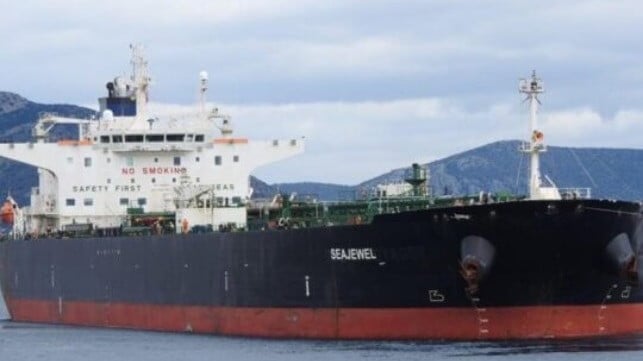Italians Investigating After Explosion Damages Greek Tanker at Savona

The Italian authorities have a mystery on their hands after discovering two underwater holes in the hull of a Greek-owned tanker offloading at the port of Savona. Investigators are exploring terrorism or sabotage but will not rule out mechanical failures or previous collision damage.
The Port Authority for Savona in Northern Italy issued a statement confirming what it called “anomalies in the unloading procedure.” The crude oil tanker Seajewel (108,888 dwt) arrived in the port on Friday, February 14 from Algeria and was directed to one of the oil terminal buoys to begin offloading. Built in 2009 and registered in Malta, the Aframax tanker has been operated by Greece’s Thenamaris since 2021.
Port officials said the “anomalies” were observed overnight between Friday into Saturday and the supervisors as a precaution suspended the offloading operation. No spills or injuries were reported among the 23 crewmembers aboard, but they are seeking to verify the origin of the anomalies.
According to media reports in Italy, the crew aboard the vessel heard two loud bangs. They reported an ingress of water and a survey of the hull revealed two damaged plates. The inner hull held and there was no leak.
The Savona Prosecutor’s Office became involved and they also brought in an elite team of divers to inspect the underside of the vessel. According to the reports, they confirmed three things. First, there is a hole about a meter in length in the hull. The hull plates are bent inwards indicating an external force, and they found dead fish in the area near the damage to the hull.
Italy’s anti-terrorism unit has also become involved in the investigation. The prosecutor’s office is not providing further details and the shipping company also confirms an investigation is underway. They are not responding to questions if the divers found residue from explosives or how or when an explosive could have been attached to the hull.
Media reports quickly traded the tanker’s past activities with the RussianTankerTacker online site showing the vessel had made frequent stops at Russia’s Novorossiysk and traveling to Turkey. Ukraine’s news agency was quick to report the vessel had transported Russian oil on at least three occasions, in February, March, and May 2024.
It is the second incident in just a matter of days that has raised questions of sabotage or terrorism targeting tankers in the Russian oil trade. Just over a week ago, Russian authorities reported a Cyprus-owned tanker, Koala, had an engine room explosion while docked at Ust-Luga. Reports quickly began to question the theory it was an engine room incident and the maritime security consultancy Ambrey Intelligence reported the tanker experienced three blasts saying it was likely hit by limpet mines.

that matters most
Get the latest maritime news delivered to your inbox daily.
Ambrey stated that other vessels with "a similar trading profile" have also been damaged by explosions. They said the common element in the incidents was vessels involved in the Russian oil trade.
Security is being maintained around the Seajewel. Local media continues to post pictures of the divers working around the vessel.
